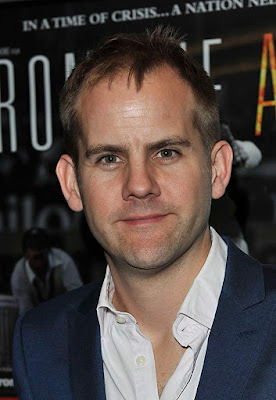TrustMovies has long been fascinated by the traveler/journalist/ novelist Bruce Chatwin. I've read every book he'd written, each of which I'd loved and been mystified by in about equal measure. Reading him is being marvelously transported then suddenly going either over the top or under the rug to the point that I would usually stop and start over from some past sentence, paragraph or even entire page. His subjects were as diverse as you could wish but his themes seemed fairly consistent to me: restlessness and the other. I would call both the man and his work ineffable -- in the sense of being somehow indescribable and also not-to-be-uttered, the latter of which was how he handled the disease that killed him. Chatwin, shown below, was one of the early victims of AIDS. Married to a woman, he kept his homosexuality and/or bisexuality tightly closeted.If you were to pick a moviemaker to also describe as ineffable, I can't imagine a better candidate than Werner Herzog, a director and documentarian whose field of interest is every bit as diverse as Chatwin's and whose approach to it all is equally memorable, as well as over the top and under the rug.
Before viewing Herzog's new film, NOMAD: In the Footstep of Bruce Chatwin, I didn't realize how very close these two men were. No wonder the film that Herzog has made captures so well the personality and strangeness of his most unusual subject. In a number of ways, these two oddball artists were made for each other.
As usual in his films, Herr Herzog hops all over the place, and if we may have trouble keeping up, at least he does not bore us. The filmmaker, shown at right, begins with some dinosaur skin -- or at least that's what Chatwin's grandmother told the kid this strange pre-historic object was (it turns out, I believe, to be part of a giant sloth). From there Herzog takes us into Chatwin's life and love of wandering, his varied interests, his writings and how some of these came about, the people he knew and loved (we meet his wife, Elizabeth, shown below, from the rear, though we do also see her face), and eventually even something of his sexuality: a horny little guy, he is said to have bedded any and every one he could, men and women alike.As you might expect, Herzog spends much of the movie's time on Chatwin's famous work The Songlines and speaks with various Aborigines and white Australians about this unusual book. Though a best-seller in several countries in the non-fiction category, Chatwin later called the book fiction, some of which it clearly was (turns out that Bruce "made stuff up" when it served his purpose and theme). Well, that's part of what makes the guy "ineffable" (or, as some might call it, "precious"). I've long felt that Herr Herzog does the same thing in many of his films; that's part of their charm and their craziness.What we learn of The Viceroy of Ouidah (and Herzog's film adaptation of it) is also fascinating, in particular the information about its star, Klaus Kinski (this film proved the last collaboration between Kinski and Herzog). Some of the archival photos enrich our understanding, as well (below are the director and his subject in their earlier days).The most moving section of the film involves Chatwin's impending death and Herzog's part in it. It's difficult to watch this and not feel, all over again, how AIDS so decimated the world's artistic community. For Herzog fans, as well as Chatwin's, the movie is a must, and I suspect it may ensnare some newcomers, too, who will then seek out this unusual writer and his work.From Music Box Films and running 85 minutes, NOMAD: In the Footstep of Bruce Chatwin will open in virtual (and even a few actual) theaters, beginning this Wednesday, August 26. To view all currently scheduled theatrical and streaming playdates, click here and then scroll down to click on Theatrical Engagements.
























































